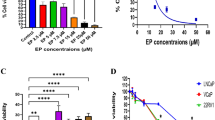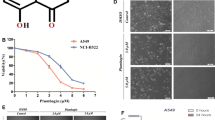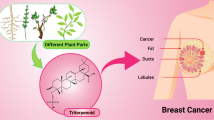Summary
To explore the effect of quercetin on the proliferation and apoptosis of HeLa cells, HeLa cells were incubated with quercetin at different concentrations. Cell viability was evaluated by MTT assay, cell apoptosis was detected by Annexin-V/PI double labeled cytometry and DNA ladder assay. Cell cycle was flow cytometrically determined and the morphological changes of the cells were observed under a fluorescence microscope after Hoechst 33258 staining and the apoptosis-related proteins in the HeLa cells were assessed by Western blotting. The results showed that quercetin significantly inhibited the growth of HeLa cells and induced obvious apoptosis in vitro in a time- and dose-dependent manner. Moreover, quercetin induced apoptosis of HeLa cells in cell cycle-dependent manner because quercetin could induce arrest of HeLa cells at G0/G1 phase. Quercetin treatment down-regulated the expression of the PI3K and p-Akt. In addition, quercetin could down-regulate expression of bcl-2, up-regulate Bax, but exerted no effect on the overall expression of Akt. We are led to conclude that quercetin induces apoptosis via PI3k/Akt pathways, and quercetin has potential to be used as an anti-tumor agent against human cervix cancer.
Similar content being viewed by others
References
Ferlay J, Shin HR, Bray F, et al. Estimates of worldwide burden of cancer in 2008: GLOBOCAN 2008. Int J Cancer, 2010, 127(12):2893–2917
Vapiwala N, Mick R, Hampshire MK, et al. Patient initiation of complementary and alternative medical therapies (CAM) following cancer diagnosis. Cancer J, 2006, 12(6): 467–474
Chirumbolo S. Quercetin in cancer prevention and therapy. Integr Cancer Ther, 2013, 12(2):97–102
Russo M, Spagnuolo C, Tedesco I, et al. The flavonoid quercetin in disease prevention and therapy: Facts and fancies. Biochem Pharmacol, 2012, 83(1):6–15
Jung JH, Lee JO, Kim JH, et al. Quercetin suppresses HeLa cell viability via AMPK-induced HSP70 and EGFR down-regulation. J Cell Physiol, 2010, 223(2):408–414
Wang P, Zhang K, Zhang Q, et al. Effects of quercetin on the apoptosis of the human gastric carcinoma cells. Toxicol In Vitro, 2012, 26(2):221–228
Chou CC, Yang JS, Lu HF, et al. Quercetin-mediated cell cycle arrest and apoptosis involving activation of a caspase cascade through the mitochondrial pathway. Arch Pharm Res, 2010, 33(8):1181–1191
Benbrook DM, Masamha CP. The pro-survival function of Akt kinase can be overridden or altered to contribute to induction of apoptosis. Curr Cancer Drug Targets, 2011, 11(5):586–599
Walker EH, Pacold ME, Perisic O, et al. Structural determinants of phosphoinositide 3-kinase inhibition by wortmannin, LY294002, quercetin, myricetin, and staurosporine. Mol Cell, 2000, 6(4):909–919
Duo J, Ying GG, Wang GW, et al. Quercetin inhibits human breast cancer cell proliferation and induces apoptosis via Bcl-2 and Bax regulation. Mol Med Rep, 2012, 5(6): 1453–1456
Vidya Priyadarsini R, Senthil Murugan R, Maitreyi S, et al. The flavonoid quercetin induces cell cycle arrest and mitochondria-mediated apoptosis in human cervical cancer (HeLa) cells through p53 induction and NF-κB inhibition. Eur J Pharmacol, 2010, 649(1–3):84–91
Zhuang J, Hawkins SF, Glenn MA, et al. Akt is activated in chronic lymphocytic leukemia cells and delivers a pro-survival signal: the therapeutic potential of Akt inhibition. Haematologica, 2009, 95(1):110–118
Cheng S, Gao N, Zhang Z. Quercetin induces tumor-selective apoptosis through downregulation of Mcl-1 and activation of Bax. Clin Cancer Res, 2010, 16(23):5679–5691
Author information
Authors and Affiliations
Corresponding author
Additional information
This project was supported by the National Natural Science Foundation of China (No. 81071663).
Rights and permissions
About this article
Cite this article
Xiang, T., Fang, Y. & Wang, Sx. Quercetin suppresses HeLa cells by blocking PI3K/Akt pathway. J. Huazhong Univ. Sci. Technol. [Med. Sci.] 34, 740–744 (2014). https://doi.org/10.1007/s11596-014-1345-6
Received:
Revised:
Published:
Issue Date:
DOI: https://doi.org/10.1007/s11596-014-1345-6




